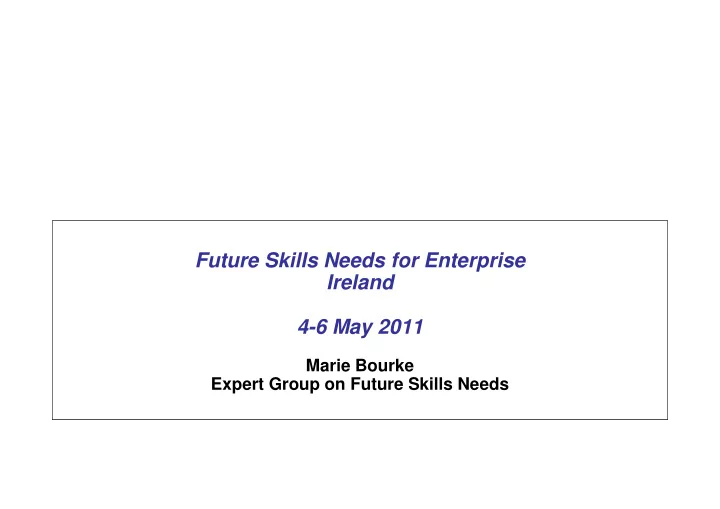

Future Skills Needs for Enterprise Future Skills Needs for Enterprise Ireland 4-6 May 2011 Marie Bourke Expert Group on Future Skills Needs
Expert Group on Future Skills Needs � Governmental Advisory Group since 1997 � Considers the Enterprise perspective � Membership (22 members, Chair – private sector) � Companies � Trade Union representative � Employer Trade bodies (large & small business associations) � Higher & Further Education (VET, universities, Adult literacy) � Enterprise Development Agencies � Guidance Counsellors for education � Gov Depts. – Finance, Education & Skills, Jobs,& Enterprise � Reports to 2 Ministers (Enterprise & Education) 2
Government appointed Group 1. Projected skills requirements at national & sectoral levels & make recommendations on how best to address identified needs 2. Priority education & training requirements 3. Skill requirements that cannot be met internally that must be met through inward migration 4. Developments in content & delivery systems that support excellence in education & training quality elsewhere & on adaptations into training provision in Ireland training quality elsewhere & on adaptations into training provision in Ireland 5. Recommend how existing systems & delivery mechanisms might be adapted 6. Convey views/recommendations on programmes supported by the National Training Fund to the Minister 7. Ensure that recommendations made are assessed by stakeholders & inform on progress made in the implementation of such recommendations
Study Objectives – Food & Beverage Sector • Conduct economic profile • Describe current & future drivers-of-change as they impact on skills • Profile composition of those employed • • Review 3rd level & agency education & training Review 3rd level & agency education & training courses • Identify the current & future skill gaps • Assess relevance of education/training initiatives in other countries • Make recommendations to address the gaps
Employee Profile -Food & Beverage Sector Of 50,000 employees in sector : • Higher proportion of men than women – 70% vs 30% • 39% (20,000) employed at ‘Plant/Machine Operative’ level 62% (30,000) - low or no level of formal 2 nd level education – • 11% higher than national average 11% higher than national average • Proportion of employees with low–level education in decline Those with 3 rd or 4 th level qualification increasing • • Significant reliance of non-Irish nationals – 24% vs 11% nationally
Skill Requirement & Gaps – CEO interviews Thematic Area Skills Gaps Internationalisation ► Commercial & negotiation skills ► Key account management ► Economic & regulatory aspects ► Brand management Innovation ► Portfolio management ► Ability to understand non-runners ► Awareness & understanding regulatory environment ► Industrial design ► Commercial / business case assessment ► Commercial / business case assessment ► Identification of deep consumer / market insights ► Incremental / existing product development Lean manufacturing ► Lean / WCM / Six Sigma with food sector experience ► Process diagnostics & control, “super-skilled” technicians, crafts Supply chain management ► Bespoke SCM in-service progs -tailored & specialist delivery ► General lack of awareness of SCM at graduate level Financial and ► Financial/commercial/IT expertise -deliver financial info. across ops commercial acumen ► Finance modules at 3rd level 6 Leadership ► Significant gaps at CEO, senior/middle management ► Leadership & entrepreneurship inadequately covered on programmes
Recommendations � Forum -address ongoing skills, training & development needs of the industry � Operatives & Supervisors • Operative and supervisor accredited upskilling programme (transferable skills) • Operative Technician Accreditation Programme • ‘Craft Accreditations’ for operatives (eg deboning, chocolatiers, cheese-making) � SCM initiative - tailored & promoted to food sector to improve competitiveness � Develop ‘ Supply Partner Networks ’ comprising retailers, Logistics & warehousing companies � Management Fast-track the dev. of graduates to take on ‘head of function’ roles • • Widespread promotion & roll-out of programmes eg ‘Transform Programme’ • Develop modularised interventions to improve commercial acumen of line managers
Key factors for effective coordination between employers & training providers • Expert Group on Future Skills Needs Meetings • Publications & follow up 6 months after publication • Conferences – circulate findings • Up-skilling Coordination Group –training & further/higher education providers • Labour Market activation measures • Labour Market activation measures • Senior Officials Group on Labour Market Activation • Ongoing dialogue with the enterprise development agencies & trade bodies (IBEC, ISME, EI & IDA) • Annual meetings with the 2 Ministers • Participation in working groups (ICT skills, Maths) 8
Thank you Information on Expert Group on Future Skills Needs is available at: www.egfsn.ie 9
Recommend
More recommend